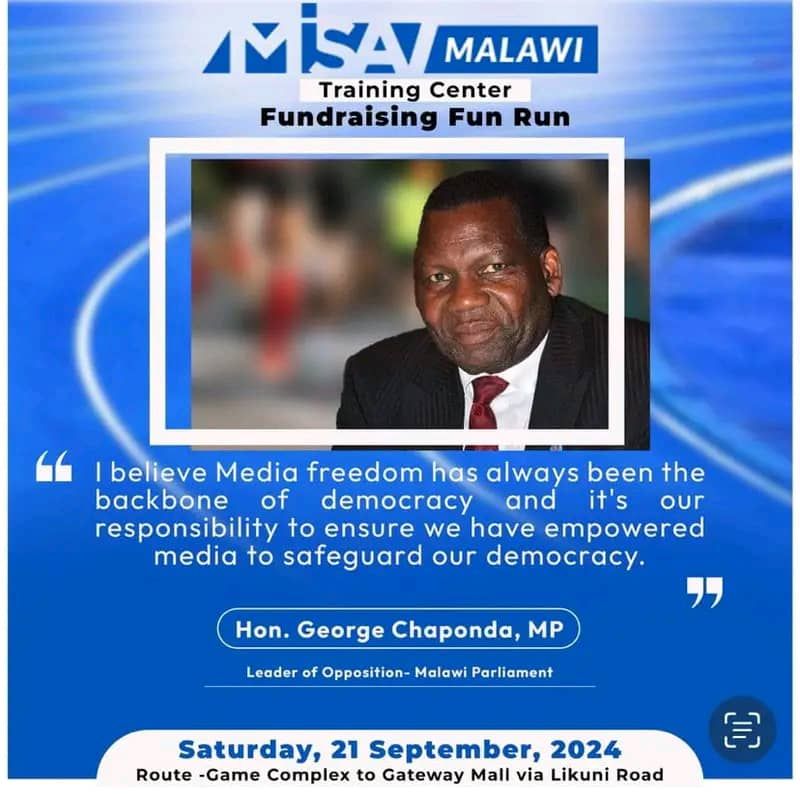By Burnett Munthali
In a notable step for promoting media freedom and bolstering democratic engagement in Malawi, Dr. George Chaponda, the Leader of the Opposition in Parliament, has pledged his support for the country’s media sector. In recent years, the role of the media in shaping public opinion, informing the citizenry, and holding the government accountable has been increasingly recognized, and Chaponda’s commitment signals a deeper recognition of the media’s critical role in a democratic society.
As Leader of the Opposition, Dr. Chaponda occupies a pivotal position in the political landscape of Malawi. His decision to support media development initiatives comes at a crucial time, as the nation grapples with a host of political and socio-economic challenges. The media’s ability to report freely, accurately, and without undue interference is essential for maintaining transparency and accountability within the government and other public institutions.

Media freedom is often considered one of the cornerstones of democracy. A robust and independent press ensures that the public remains informed about political developments, government policies, and issues affecting their daily lives. It also provides a platform for diverse voices, particularly the marginalized, to be heard. In this regard, Dr. Chaponda’s initiative to support the media is a step in the right direction, aligning with broader efforts to strengthen democracy in Malawi.
Chaponda’s backing of media institutions comes amid growing concerns over press freedom in various parts of Africa. While Malawi has generally maintained a fair degree of press freedom, challenges such as political pressure, limited resources, and restrictive regulations continue to hinder journalists’ ability to perform their duties effectively.
By stepping up to support media outlets, Dr. Chaponda is advocating for an environment where journalists can operate without fear of retribution. This involves ensuring that laws protecting media freedom are upheld, and that journalists have access to the resources they need to report on critical issues facing the nation.
In his recent address, Chaponda emphasized the need for collaboration between political leaders and the media, stating that such cooperation is essential for fostering a culture of transparency and accountability in governance. He acknowledged that a well-functioning media serves as a watchdog, not only for the ruling party but for opposition figures as well. By supporting the media, he positions himself as a leader who values open dialogue and public scrutiny.
This move could also be interpreted as a strategic one. By aligning with the media, Chaponda is likely to build a stronger rapport with journalists and the broader public, ensuring that his messages and those of the opposition reach the people. His support could further enhance his image as a democratic leader who is committed to upholding the principles of free speech and media independence.
Challenges Facing the Media in Malawi
Despite the positive strides being made, Malawi’s media still faces a number of challenges. Limited funding, inadequate access to information, and the threat of censorship are just a few of the issues that media houses contend with on a regular basis. Furthermore, the evolving digital landscape has introduced new complexities, as journalists must now navigate the realms of online misinformation, harassment, and cyber threats.
Dr. Chaponda’s backing is, therefore, not only symbolic but potentially transformative. If translated into concrete actions, such as advocating for increased funding, press protection laws, and capacity-building initiatives, it could help uplift the media sector in Malawi. His support for training programs, particularly in investigative journalism, could empower journalists to dig deeper into stories of national importance, thereby improving the quality of news reporting.
As Dr. Chaponda leads the opposition, his stance on media freedom could also serve as a model for other political figures to follow. The media is not only a platform for government critique but also a space for open political discourse and the exchange of ideas. By supporting media freedom, Chaponda is fostering a political culture that is more inclusive and democratic.
While much remains to be seen in terms of the concrete steps Dr. Chaponda will take to support the media, his acknowledgment of its importance is a welcome development in the Malawian political landscape. As the country continues to navigate its political journey, a vibrant, independent media will be essential for fostering a well-informed electorate and ensuring the longevity of its democratic institutions.
In conclusion, Dr. George Chaponda’s commitment to supporting the media is a promising development for Malawi’s democracy. His actions could pave the way for more constructive engagement between political leaders and the press, ultimately benefiting the citizens who rely on accurate and timely information. As the media continues to play a crucial role in shaping the national conversation, Chaponda’s support will be instrumental in ensuring that this vital institution remains strong, independent, and able to serve the public interest effectively.


